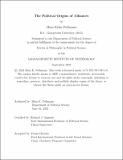The Political Origins of Alliances
Author(s)
Pollmann, Mina Erika
DownloadThesis PDF (1.346Mb)
Advisor
Samuels, Richard J.
Terms of use
Metadata
Show full item recordAbstract
Our understanding of the causes of alliance formation is limited by a lack of theoretical interest in what types of concerns might inhibit alliance formation and insufficient empirical interrogation of cases of alliance formation compared to cases of alliance non-formation. My dissertation seeks to improve our understanding of the causes of alliance formation by applying an original typology of anti-alliance concerns in examining eight cases of successful alliance formation alongside six cases of failed alliance negotiations. Based on the existing alliance literature, I identify the following seven types of anti-alliance concerns: asymmetry, liability, autonomy, provocation, rigidity, entanglement, and defection. I find that asymmetry concerns - the concern that the potential allies do not actually share a mutual threat - were the most significant (coded as high in 9 out of the 14 cases) across successful and failed alliance negotiations, and that asymmetry and entanglement concerns - the concern that the potential ally will force the state to support it in a “costly and unprofitable enterprise” - were the most prevalent (coded as high or low in 10 out of the 14 cases) across successful and failed alliance negotiations. The relationship between the type and/or number of high concerns and alliance formation is weak to nonexistent. Furthermore, in four out of the six most similar paired comparisons of a failed alliance negotiation to a successful alliance negotiation, the different outcomes (i.e., failure versus success) were better explained by different domestic political conditions (i.e., more unfavorable versus more favorable) rather than by differences in the strategic soundness of the proposed alliance (i.e., more strategically unsound versus more strategically sound). An interesting policy implication from a deeper dive into the negotiation processes is that while autonomy, rigidity, and entanglement concerns appear negotiable between the potential signatories, asymmetry, liability, and provocation concerns appear non-negotiable. Defection concerns were not prevalent enough for meaningful analysis of negotiability, though I speculate that defection concerns, when present, are so prohibitive that alliance negotiations do not even begin.
Date issued
2023-09Department
Massachusetts Institute of Technology. Department of Political SciencePublisher
Massachusetts Institute of Technology